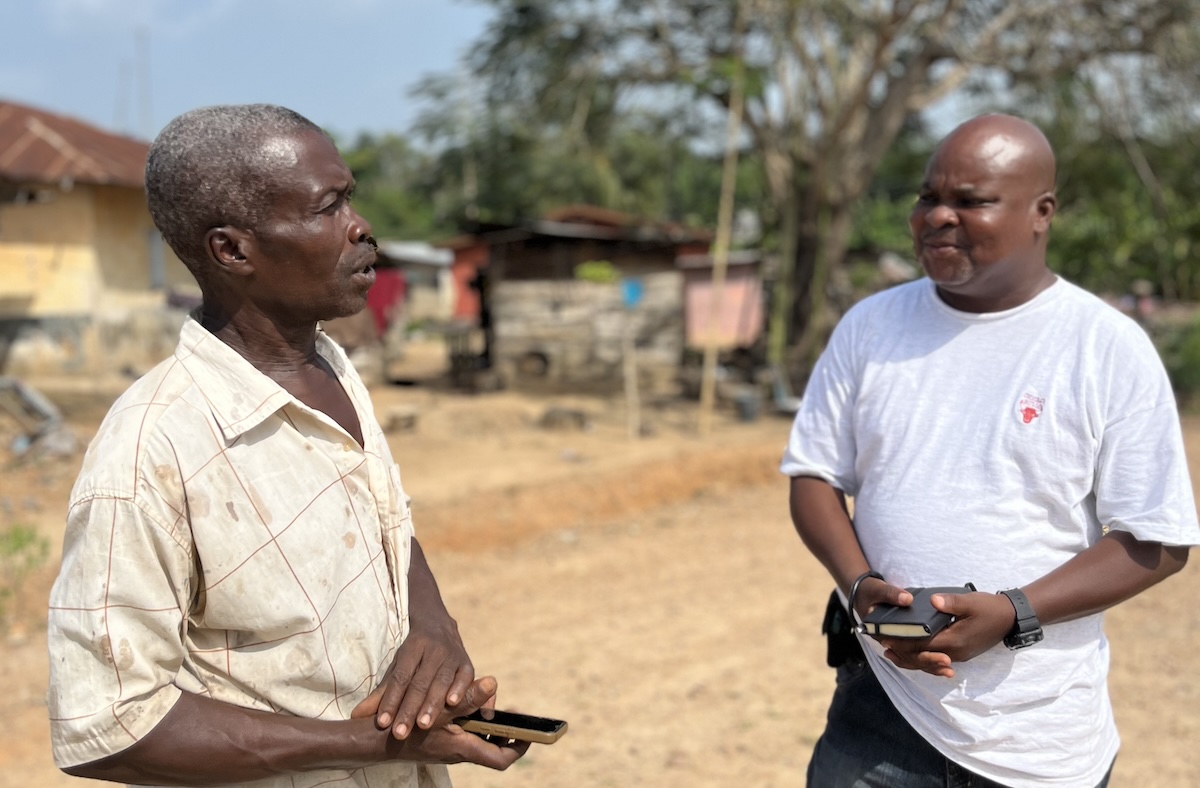James (left) speaks with a trainer on his farm in Mfranta, Ghana.
James has spent the majority of his life balancing teaching and farming. As the son of the chief farmer in Mfranta, a community in Ghana’s Eastern region, agriculture was always an integral part of his identity, but he built a career as a teacher. He eventually served as a lecturer of vehicle technology and drawing at a technical institute.
Over the years, he cultivated five acres of oil palm, three acres of cocoa, five acres of coconut and three acres of orange before venturing into maize production. Despite his decades of farming experience, maize farming humbled James. “People assume that after years of farming, one should achieve perfection. But every crop is different and has unique needs. Farming is a continuous learning process,” he admits.
On his three-acre maize farm, traditional farming methods were holding him back, limiting his productivity. The results were poor, with just 10 bags (100kg each) of maize being harvested per season. He was planting without enough space between rows, relying on low-yield local maize varieties and struggling with climate-resilient agriculture.

Improving production practices with Acting Now
James joined the Acting Now programme’s sustainable agriculture training in his community with the goal of improving his yields. The programme, funded by the Dutch Ministry of Foreign Affairs, is designed to provide farmers with knowledge and skills for sustainable production and addresses food production challenges in the country.
“With the decline in climate conditions, it is crucial for farmers to adopt climate-friendly practices to make their farms more resilient and maximize their output. Seeing the farmers we trained achieve such results is very rewarding”
Kwame Amoyaw Darko, an agriculture extension agent and trainer for the Acting Now programme
James’s training provided lessons in site selection, land preparation, seed treatment, nursery management and good agricultural practices (GAP). He quickly applied what he had learned to his maize farm. He transitioned to hybrid seeds, which are high-yielding, resistant to pests, fast-maturing and better suited to withstand harsh weather conditions. “I abandoned the unsustainable farming methods I had practiced since childhood and rigorously applied what I learned from the training. My farm productivity improved almost instantly,” he shares.
Today, the results speak for themselves. James now produces 30 bags of maize per season from the same three-acre farm that once yielded only 10. At 900 Ghana cedis (64.15 euros) per bag, his income has tripled to 27,000 cedis (1924.45 euros) per harvest. “My income tripled simply by applying the knowledge I gained from the training I received. I am using the extra income to support my wife’s business,” he shares.
“James’ journey shows how adopting good farming practices can transform the livelihoods of smallholder farmers. These improvements go beyond individual farmers; they strengthen families, uplift communities and contribute to building more resilient and sustainable agriculture in Ghana.”
Bismark Odum, Programme Coordinator for the Acting Now
Supporting household business
The training’s impact reaches beyond James himself. He is now able to support his wife’s business in Accra, where she sells kenkey, a local meal made from maize.
“I supply my maize to the woman my wife buys kenkey from, and I am also able to give her funds directly. In a way, I’m strengthening her business at both ends,” he smiles.
For James, farming in his 60s isn’t about slowing down. It’s about proving that with the right knowledge, even long-time farmers can unlearn, relearn and grow.


